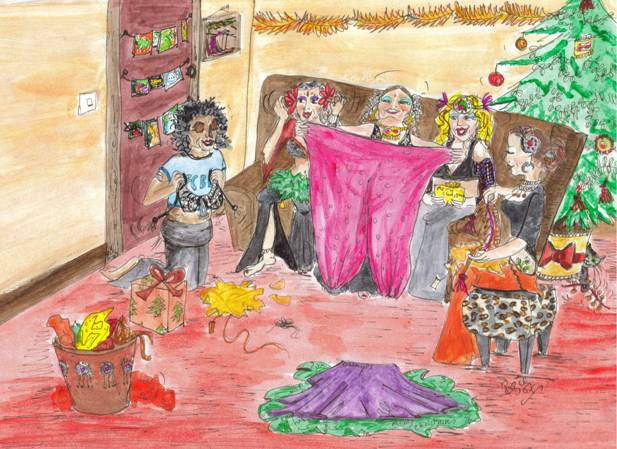I got married recently and my hubby (Suraj) and I received quite a few presents. Good right? Well, the thing is, we did not expect them.
We went for a small wedding to reduce the ‘bhaar’ (load, burden) on others as well as ourselves. We don’t really want to continue with the way things are. We tried to show this through our wedding in terms of how we organised it but because of tradition, obligation or love we received presents.
This post isn’t about our wedding. It’s about something we call ‘vehvar’ in Gujarati.
What is vehvar? Well, it’s something that you give someone for an occasion, expecting them to reciprocate when you have a similar event of your own. This could be a regular occasion e.g. Diwali and birthdays or a ‘one off event’, such as, a wedding.
‘Vehvar varvanu’ refers to the expectation that it will be repaid/given back when the time is right.
Vehvar varvanu explained
In the past, if someone was really close to my mum, for example, they would show their love for her by giving me a present for an occasion like those mentioned above. Thus mum would keep track of who gave what and when so that she could give something back when appropriate. One expression of fondness/gratitude then becomes a cycle of giving and receiving.
When someone got married, it was traditional AND common for the parents to keep all the presents and then give them to their child and his/her spouse when there was a particular occasion OR use the gifts to help themselves when the time arose for them to give something back to the people who gave the presents in the first place.
A made up example – I got married and my mum’s really close to Chaya who gives me £21. Mum then gives Chaya’s child £21 when they marry unless £21 is worth a lot less when Chaya’s child marries. Most people used to give £5 when they attended a wedding or reception. Most people give £11 now because you can’t buy much £5 anymore.
Things have changed. Mostly, parents now give their children whatever gifts they receive.
Wedding lists
Is it fair to impose a wedding list on your guests? I know of people who have put the details of their wedding list with the invite which would be fine if most of the items weren’t very costly. For example, attending a wedding and giving £11 is different to being given a wedding list where the cheapest item costs £25. That’s over double what you intended to give. Alternatively there may be an item that costs £2.50 but it only purchases one spoon. If you’re not comfortable with giving a few spoons and you want to give a set of 12, this would cost £18.
My cousin had a wedding list when he got married and I thought it was excellent! But he was my first cousin whom I considered to be my brother. I WANTED to give him and his wife a gift that they wanted, would use, would keep and would cherish. Money can get ‘lost’, in that it can be spent and you lose track of what you bought with it. This can be avoided if you earmark money for a specific thing so that you can think of the giver every time you use whatever you bought. Anyway I preferred to give them an item of their choice and I liked that they knew it’s from me. Is there a place for wedding lists? I think so but maybe the details should be given out if requested or to immediate family only. This would avoid placing bhaar on those who don’t want to or can’t give.
How does it become a cycle of giving and receiving?
It then gets passed down! Once the adults have died or are unable to continue with these expenses, it is expected that the children will take it on. The boys get off quite easily here because whether they are married or not and whether they live with their parent’s or not, they are classified as part of their parent’s household. Thus if their parents attend a wedding and give a present, the vehvar would count as being from the parents, sons, their wives etc.
Daughters are different!
However, once a daughter is married, she is classed as having a separate home. This can often mean that she is not invited to events that her brothers may be invited to. The need to cut numbers and keep the relationships considered when deciding who to invite minimal; often means that married daughters are left out. That means no vehvar right? Well yes, BUT if she is invited, she isn’t perceived as being included in the present that her parents give. Thus she’ll need to give her own gift or break tradition and give nothing.
Wedding invites
This also branches out to invites. We went to a reception and witnessed someone jokingly telling someone else that she was waiting for her invite to his son’s wedding. You see, her child had recently got married and they invited the whole of his family. His son is now getting married and they have cut costs and guests so they haven’t invited them at all. She is offended, he feels bad, expectations have not been met. Of course, on the other hand you can organise whatever you want and you can make it as grand as you want. However, for the longest time I’ve believed that organise/buy what you can afford or you go without. Would you want to get into debt so that you can ‘payback’ an invite? It’s not as simple as this. There are issues about the bride/groom not wanting all these people there because they don’t know them! Even if they were invited to this lady’s child’s wedding, it was because the parents know each other, so why should they reciprocate? This is not a clear cut issue. It is very often emotional and therefore difficult. However, I have mentioned it in this post because the invite counts as a vehvar in the sense that people often expect an invite back.
So why want to reduce the giving and receiving that we are involved with.
All of the above and more wanted us to stop partaking in this.
We wanted to reduce the bhaar on others. One less present/cost for the ‘giver’ right?
We’re not sure if we’ll be in a position to reciprocate. We don’t want to take with one hand and give nothing back with the other.
We may not want to reciprocate.
Is it not a good idea to liberate our offspring from all this?
A bit more about how it all works
Often the eldest son gives and he will put the names of his younger brothers and sisters on the envelope/present even though they haven’t contributed. Is this fair?
Within families, traditionally, elder siblings give to their younger brothers and sisters but will not accept from them. This means the eldest has to shell out a lot but gets nothing back. Is this fair? The other siblings will receive something from those who are elder to them but the firstborn wont have anyone older to spoil them.
Of course, someone would need to keep a tally of it all and people are often offended when they don’t receive what they expect.
Other invites
A colleague of mine was talking to me about a birthday party she’s arranging for her son. She gets invited to lots of parties and she attends. Can you imagine what she’s thinking about? How can she leave them out when she arranges her son’s party? How much will it cost to include all these friends, their partners and their children? She doesn’t have a huge family but her hubby does so they all need to be invited too. If she has it at home, there’s no room so they’ll need a marquee. If not, should she hire a hall? Catering. Decorations. Parking. So many things to consider! Another form of vehvar.
Unwanted presents
What about receiving a present you don’t want? I remember receiving many presents that I would not wear, use or display. I am not ungrateful. I’m just being honest. I used to keep all these things through fear of offending the giver. Can you imagine the clutter? 🙂 Now I give it to a shop that raises money for charity or I give it to my mum to give to other people for her ‘vehvar varvanu’. In my mind, it’s such a shame. A waste of the ‘givers’ time in buying it and the money that they spent on it too.
So what do you think? Continue? Stop? Is there a middle ground?





10 Comments
Anon · February 5, 2009 at 2:01 pm
Vehvar!!!
Ur topics are so close to the heart at the mo…
Endless arguments with the folks over this…
The typical, I don’t like this sari so I’ll give it away or I gave this to her, she must have given it away and they gave it me back! Its a endless.
My dad is spending way too much over vahvar. Money my brother could use…
I tried to stop vehvar with my youger siblings / cousins but after my son was born you feel obliged when they give something to him…
Its a complete mind shift thats required and will take at least 2/3 generations to overcome.
Anyway, thats my rant…
Heena Modi · February 5, 2009 at 2:47 pm
Your thinking is very similar to mine! It’s refreshing 🙂 So we’re either both confused or forward thinkers. Can you think of any other labels/descriptors?
Conversations re presents – Yes I remember those. That’s not a nice sari, she must have received it from someone or had it for years and she doesn’t like it so she gave it to you. I’ve also heard people saying that the present they got was naff but they’d keep it and give it back to the ‘giver’ via a member of their family so that they feel how lame a present it was.
Oh dear! Keeping track of all that, not missing an opportunity to avenge being given a ‘bad’ present. It’s difficult isn’t it? It’s difficult to listen to , especially when you don’t think that way. But I guess that’s the same for everything e.g. it’s difficult to listen to racist talk if you are not racist, it’s hard to be part of a conversation mocking people with difficulties with speech if you are compassionate etc.
Anyway a mind shift, it definitely is.
Well done for doing what you can with your siblings and cousins 🙂
Heena 🙂
D · May 5, 2009 at 4:20 pm
I’ve read your article and it makes lots of sense. However, age doesn’t come into it. I give presents even thought I’m younger. I am also a sister and my siblings accept gifts from me.
Heena Modi · May 5, 2009 at 4:31 pm
Thanks for your reply.
Perhaps your family operate differently to the many I’ve spoken to. At the end of the day I guess as long as it works and people are happy with it; it’s fine. Right? 🙂
Vik · May 5, 2009 at 4:22 pm
In my family they believe that the younger sibling should not give to their elder but I do not agree with it.
Why should the elder siblings always ‘dish out’? In this day and age, this unfair system needs to change.
Also now that men and women earn I don’t see why sisters and brothers shouldn’t give to each other.
Does anyone else have any views?
Heena Modi · May 5, 2009 at 4:30 pm
This all makes sense.
I think the thing about sisters stems from the idea that she would now be under her husband’s home and she would be a dependent on him and his income. Thus one shouldn’t accept gifts from a sister.
I guess now that many homes have dual earners, perhaps it’s not an issue 🙂
Bhabhs · May 5, 2009 at 4:24 pm
It’s all too materialistic and stressful.
Only recently my son realised that I’m not nosy! When he gets a present I ask him what he got, if it was for an occasion and who it was from. This is so that I can ‘repay’ it and make sure I give back when a similar situation arises in the family of the person who gave the gift.
Heena Modi · May 5, 2009 at 4:29 pm
How did he feel about it all when you explained it?
Anon · May 5, 2009 at 4:26 pm
My sister gives my son, my husband and myself presents.
However, she lives alone. Thus when it comes to vehevaar varvanu, I give to her daughter and her grandson. This way, I give back what I got and it goes to the people that most matter to her.
My sister wont accept much from me because she’s older.
Heena Modi · May 5, 2009 at 4:28 pm
This rings a bell. I’ve heard similar things from many people from different ‘Indian’ communities and sects.
Doesn’t it get too much?
Comments are closed.